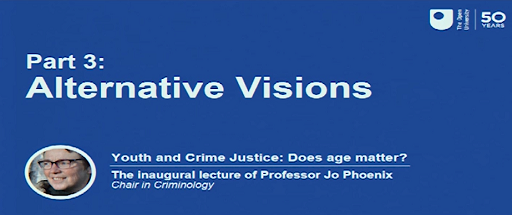5 Abolishing youth justice, championing children’s rights
The deflation of the youth justice system established in 1998 by the New Labour government in England and Wales has been dramatic and largely unplanned. The contraction of resources has been driven by austerity measures in the economy, and the deflation in the youth justice system has been driven by a collapse of faith in the efficacy of interventions it delivered.
A major review of the youth justice system conducted by Charles Taylor published its report in 2016. It advocates an approach prioritising ‘the child first and the offender second’ (Taylor, 2016, p. 3). The report proposed more diversion and the establishment of Children’s Panels to decide on interventions. It also recommended the establishment of a new form of education-focused secure institution to replace young offender institutions (YOIs). The report received a lukewarm response from a Conservative government disinclined to take radical, complex and potentially controversial steps to restructure the youth justice system while trying to negotiate the UK’s withdrawal from the European Union (Transform Justice, 2016).
The policy paralysis that accompanied the four years leading up to the formal ratification of Brexit in January 2020 has prompted louder calls for the complete abolition of the youth justice system (Case and Haines, 2020). What might this mean or look like? In the next activity you can take a closer look.
Activity 5 Community oriented justice
As The Open University celebrated its 50th anniversary in 2019 (see Earle and Mehigan, 2019) some of its senior academics were invited to present lectures that reflected their understanding of and contributions to contemporary issues. Professor Jo Phoenix chose to talk about youth crime and the youth justice system. This has been a focus of her work as a social scientist for over 30 years. In her lecture she reviewed some of the issues that have been explored in this course and ended her presentation with a call for alternatives, daring alternatives developed in the bold tradition of The Open University itself. Established in 1969, The Open University broke with the elitism and exclusivity of the conventional university system and adopted a mission ‘to be open to people, places, methods and ideas’. Listen to the final section of Professor Jo Phoenix’s lecture, the title of which is ‘Youth Crime and Justice: Does Age Matter’ presented in the 50th anniversary year of The Open University.

Transcript: Video 1
Discussion
The abolition of the youth justice system, or its replacement with community courts addressing a range of social injustices undifferentiated by age, is a radical and utopian vision. Jo Phoenix insists her ideas are not a fully-fledged blueprint for change, but instead represent a very different way of thinking about what the problem is, where solutions can be found and who can make it happen. She closes by suggesting that without these utopian visions there would be no such thing as The Open University – a university open to all, regardless of previous education and schooling. Her ideas are radical by seeking to remove the child, the age-defined individual, from the picture entirely. Open thinking from an open mind, she challenges us to go further, think harder and find real change.
Radical reduction in the size and reach of the youth justice system may or may not be a continuing feature of the uncertain future of the UK, but one thing is certain for now. There will be a need for a continuing focus on children’s rights to safeguard their well-being in society. For this reason, this course on youth justice will end with a leap out of the territory of the United Kingdom (UK) into the universal concerns of the United Nations (UN). The United Nations is an international forum established at the end of the second world war after the triumph over fascism. It reflected global concern that the implications of racism and narrow nationalistic interests that had tipped into genocide against Jewish people and other ethnic minorities demanded a planetary structure to maintain peace and to promote progress, better living standards and human rights for all the people of the world. The Universal Declaration of Human Rights was drafted in 1948 as the platform of the United Nations. It has become an important reference point for developing support for human rights, and the particular rights of children.
